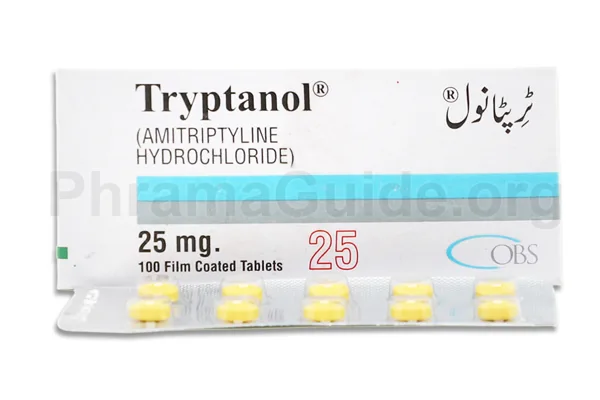Tryptanol tablet belongs to a class of drugs known as tricyclic antidepressants (TCAs), used for central nervous system problems related to mood and emotions. Following are some common uses of Tryptanol Tablet:
- Depression: Tryptanol tablet is used to treat major depressive disorder and can help alleviate symptoms such as persistent sadness, loss of interest, changes in appetite or sleep patterns, feelings of guilt or worthlessness, and difficulty concentrating.
- Neuropathic Pain: Tryptanol tablet is often prescribed for the management of neuropathic pain, which is pain caused by damage or dysfunction in the nerves. It may be effective in conditions such as diabetic neuropathy, postherpetic neuralgia (pain following shingles), and certain types of nerve injuries.
- Migraine Prevention: Tryptanol tablets are sometimes used as a preventive treatment for migraines. It can help reduce the frequency and severity of migraine attacks, although it may take several weeks for the full benefit to be realized.
- Anxiety Disorders: Tryptanol tablets can be used in the treatment of anxiety disorders such as generalized anxiety disorder (GAD) and panic disorder.
- Fibromyalgia: Tryptanol tablets may be used for the management of fibromyalgia, a chronic condition characterized by widespread pain, fatigue, and tender points in specific areas of the body. It can help reduce pain and improve sleep in some individuals with fibromyalgia.
Off-label Uses of Tryptanol Tablet
- Insomnia: Due to its sedative properties, Tryptanol tablet may be used off-label for the treatment of insomnia, particularly when associated with depression. It can help improve sleep quality and duration.
- Irritable Bowel Syndrome (IBS): Tryptanol tablets may be used off-label for the treatment of certain symptoms associated with irritable bowel syndromes, such as abdominal pain and discomfort. It can help alleviate pain and improve bowel function in some individuals with IBS.

What is Tryptanol?
Tryptanol is one of the leading brands of Amitriptyline (HCL), manufactured and marketed by OBS Pharmaceutical, Pakistan.
Tryptanol Alternatives : Other Similar Brands
The following are some alternative brands of Tryptanol and their manufacturers.
- Amyline : Siza International (Pvt) Ltd, Pakistan.
- Amitin : Glitz Pharma, Pakistan.
- Amotrip : Pharmedic (Pvt) Ltd, Pakistan.
- Nortensil : Specific Research Laboratories, Pakistan.
- Amitryp : Dr. Raza Pharma (Pvt) Ltd, Pakistan.
- Ready : Xenon Pharmaceuticals (Pvt) Ltd, Pakistan.
- Triptylin : Caraway Pharmaceuticals, Pakistan.
Tryptanol : Available Formulations and Strengths
Presently, Tryptanol is available in Tablet Form.
Tryptanol Tablet : 25mg strength.
Who Should Not Use Tryptanol?
Tryptanol has several contraindications, and it should not be used in certain circumstances due to potential risks and adverse effects.
- Hypersensitivity: Tryptanol should not be used in individuals who have a known hypersensitivity or allergic reaction to Tryptanol or any other tricyclic antidepressants (TCAs). Allergic reactions can range from mild skin rashes to severe systemic reactions, including anaphylaxis.
- Recent myocardial infarction: Tryptanol is contraindicated in individuals who have recently experienced a myocardial infarction (heart attack). It can increase the risk of arrhythmias and other cardiac complications in this population.
- Concurrent use of monoamine oxidase inhibitors (MAOIs): Tryptanol should not be used in combination with or within 14 days of discontinuing the use of MAOIs. The concurrent use of Tryptanol and MAOIs can lead to a potentially life-threatening condition called serotonin syndrome, which is characterized by symptoms such as high fever, agitation, rapid heartbeat, muscle stiffness, and changes in mental status.
- Acute recovery phase after myocardial infarction: Tryptanol is generally contraindicated in the acute recovery phase following myocardial infarction. It can increase the risk of arrhythmias and other cardiovascular complications during this critical period.
- Narrow-angle glaucoma: Tryptanol should not be used in individuals with narrow-angle glaucoma. It can increase intraocular pressure and worsen the condition, potentially leading to vision problems and other complications.
- Urinary retention: Tryptanol is contraindicated in individuals with urinary retention, as it can further impair bladder function and exacerbate this condition.
What is the Recommended Daily Dosage of Tryptanol?
Tryptanol Dose for Depression:
- 1 to 2 Tablets of 25mg, Three times a day.
- The dose may be adjusted by a healthcare professional based on the individual’s response and tolerability, and it can range from 50 to 300 mg per day.
Tryptanol Dose for Neuropathic Pain:
- One Tablet of 25mg per day.
- The dose may be gradually increased over time to achieve optimal pain relief, typically ranging from 25 to 150 mg per day.
Tryptanol Dose for Migraine Prevention:
- One Tablet of 25mg per day.
- The dose may be increased gradually up to 75 to 150 mg per day, depending on the individual’s response.
How Tryptanol Works?
Tryptanol works by inhibiting the reuptake of serotonin and norepinephrine in the brain. Blocking the reuptake transporters responsible for removing these neurotransmitters from the synaptic cleft, increase their concentrations and enhances their effects. This action helps to improve mood and alleviate symptoms of depression.

Leave A Comment